

The Nazi Inspiring China's Communists. Chinese President Xi Jinping has markedly shifted the ideological center of gravity within the Communist Party.
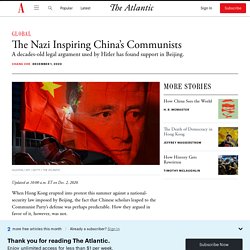
The limited tolerance China had toward dissent has all but dissipated, while ostensibly autonomous regions (geographically as well as culturally), including Xinjiang, Inner Mongolia, and Hong Kong, have seen their freedoms curtailed. All the while, a new group of scholars has been in ascendance. Known as “statists,” these academics subscribe to an expansive view of state authority, one even broader than their establishment counterparts. Only with a heavy hand, they believe, can a nation secure the stability required to protect liberty and prosperity. As a 2012 article in Utopia, a Chinese online forum for statist ideas, once put it, “Stability overrides all else.” Prioritizing order to this degree is anathema to much of the West, yet perspectives such as these are not unprecedented in Western history. That affinity is no accident.
Croaking Cassandra 15/10/20 on Anne Marie Brady. Anne Marie Brady Holding a pen... Inside China's mass surveillance for secrets and scandal. By ABC political editor Andrew Probyn and political reporter Matthew Doran A Chinese company with links to Beijing's military and intelligence networks has been amassing a vast database of personal information, including on Australians and New Zealanders, and prominent and influential figures.
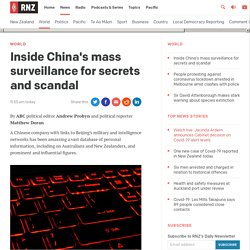
Much of the information has been scraped from open-source material, but some appears to have been sourced from confidential files. Photo: 123rf A database of 2.4 million people, including more than 35,000 Australians, has been leaked from the Shenzhen company Zhenhua Data which is believed to be used by China's intelligence service, the Ministry of State Security. Zhenhua has the People's Liberation Army and the Chinese Communist Party among its main clients. Information collected includes dates of birth, addresses, marital status, along with photographs, political associations, relatives and social media IDs.
Magic weapons. New Zealand's relationship with China is at a tipping point. This week New Zealand announced it was suspending its extradition treaty with Hong Kong as a result of Hong Kong’s new national security law.
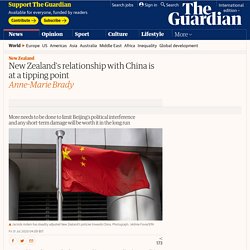
At the same time, NZ changed its policy on military and dual-use goods and technology exports to Hong Kong, subjecting the city to the same as the People’s Republic of China (PRC). The New Zealand government also issued a travel warning to New Zealanders on the risks of travelling to Hong Kong. Anne Marie Brady. What Would a Cold War With China Look Like? Chinese pressure on trade. A harbour no more - China’s draconian security law for Hong Kong buries one country, two systems. THE CHINESE government is spreading fear in Hong Kong.
Hong Kong’s suffering holds a lesson for the world. China’s rulers cannot be trusted to keep their promises and they will stop at nothing to suppress dissent. This calls for heightened vigilance about China’s rise, especially as it affects Taiwan. The party has shown that it would rather be feared than admired. – barbaragrieve
The first shock came in May, when it announced plans to impose a sweeping national-security law on the territory, without the say-so of its legislature.
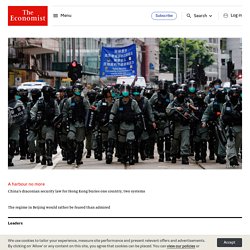
Then it drafted the bill behind closed doors, keeping details secret even from Hong Kong’s administration. Even after the law was passed on June 30th by China’s rubber-stamp parliament, hours passed before it was published at close to midnight. The 18-page bill, which took effect that day, was harsher even than the gloomiest analysts had predicted. It is one of the biggest assaults on a liberal society since the second world war. Chinese officials argue that they are doing nothing wrong: national-security laws are common around the world, even in democracies.
Rule by fear - China’s national-security bill for Hong Kong is an attempt to terrify. THE ARMOURED vehicles of China’s security forces have not rolled onto Hong Kong’s streets, as last year officials in Beijing hinted they might amid anti-government turmoil in the territory.
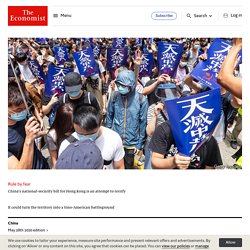
But late in May Chinese officials may have done more than their troops would have to kill the notion of a “high degree of autonomy” in Hong Kong, which was promised when it returned to China in 1997. As Chinese legislators gathered in the capital for an annual, coronavirus-delayed meeting, the body’s standing committee dropped a bombshell. The committee said it had reached a “decision” that China would impose a national-security law on Hong Kong. Raging at China over coronavirus won't help – scrutinising our own governments might. He was once fearful of endangering the country’s deep economic relationship with China, but the Australian prime minister, Scott Morrison, has now begun to campaign for an international inquiry into the Covid-19 outbreak.
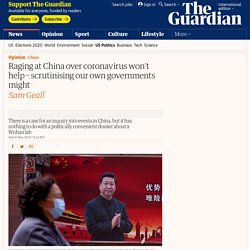
The call comes amid claims from the Trump administration that China covered up a laboratory leak in Wuhan, or even released the novel coronavirus on purpose. The tenor of debate in the United States gives an indication of the stakes. 'People have been awakened': seeking Covid-19 answers in Wuhan. In early January, Hu Aizhen, 65, heard that a new coronavirus had emerged in her home city, Wuhan.

She was not worried – officials said it was not contagious – so she went about her days as usual and prepared for the lunar new year at the end of the month. Just before the city was put under lockdown, Hu developed pneumonia symptoms. After days of waiting and searching for a hospital, she was tested for the virus. Her result was negative, but tests at the time were known to be inaccurate and she showed obvious signs of the virus. Nevertheless, she was refused treatment by six hospitals. Translation: Essay by Missing Property Tycoon Ren Zhiqiang. Real estate tycoon turned commentator Ren Zhiqiang, known as “the Cannon” for his online outspokenness, was one of the few liberal “Big V” microbloggers remaining on Weibo after a 2013 rumor crackdown leveled prominent voices on the platform.

In February 2016, Ren was banished from social media after criticizing a Xi Jinping’s speech emphasizing the media’s duty to serve the Party. Ren was also given a one-year probation from the Party and attacked by official media. Revisiting Chinese neocolonialism. The debate about Chinese neocolonialism is long standing but has re-emerged with new force for two reasons.
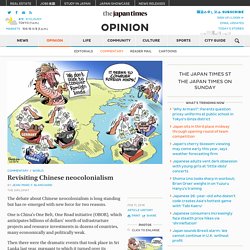
One is China’s One Belt, One Road initiative (OBOR), which anticipates billions of dollars’ worth of infrastructure projects and resource investments in dozens of countries, many economically and politically weak. Then there were the dramatic events that took place in Sri Lanka last year, pursuant to which it turned over its Hambantota port and a massive amount of land in Colombo port to Chinese multinational corporations (MNCs) in return for debt relief. To top it off, we are seeing Chinese military bases (in Djibouti) and security “advisers” (in Pakistan) in places where China has strong economic interests.
Anne-Marie Brady warns MPs of Xi Jinping's 'foreign-influence campaign' In the Xi-era, Brady said United Front work falls into four categories.
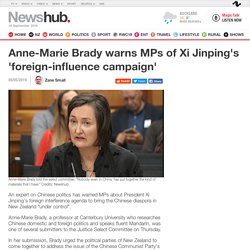
Efforts to control the Chinese diaspora and utilise them as agents of Chinese foreign policy.Efforts to influence foreigners into supporting and promoting the CCP's foreign policy goals.Promoting China's agenda through communications and supressing critical perspectives. Pb2016 12. Inside China’s secret ‘magic weapon’ for worldwide influence.
James Kynge in London, Lucy Hornby in Beijing and Jamil Anderlini in Hong Kong Print this page Experimental feature Listen to this article or Give us your feedback Thank you for your feedback. Deciphering Chinas AI Dream. China wants to shape the global future of artificial intelligence. China isn’t just investing heavily in AI—its experts aim to set the global standards for the technology as well. Academics, industry researchers, and government experts gathered in Beijing last November to discuss AI policy issues. The resulting document, published in Chinese recently, shows that the country’s experts are thinking in detail about the technology’s potential impact. Together with the Chinese government’s strategic plan for AI, it also suggests that China plans to play a role in setting technical standards for AI going forward.
Chinese companies would be required to adhere to these standards, and as the technology spreads globally, this could help China influence the technology’s course. Indeed, big Chinese companies including Tencent and Alibaba are rapidly adding AI capabilities to their cloud offerings and selling those services overseas (see “Inside the Chinese lab that wants to wire the world with AI”).
The discussion of privacy is revealing. Political Roundup: China's 'magic weapons' in NZ. In a tumultuous year in politics, it's been easy to overlook important and controversial arguments about Chinese Government influence in this country. A number of stories and reports have been published that require much greater attention, debate and scrutiny.
At one level, media coverage of Chinese Government influence in New Zealand has increased significantly over the last four months.